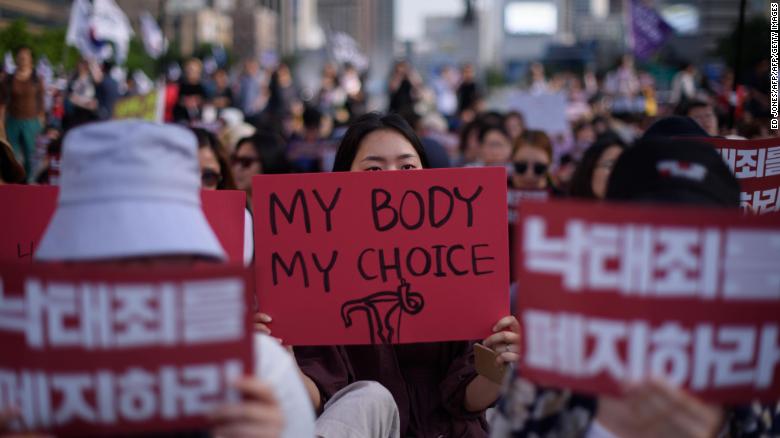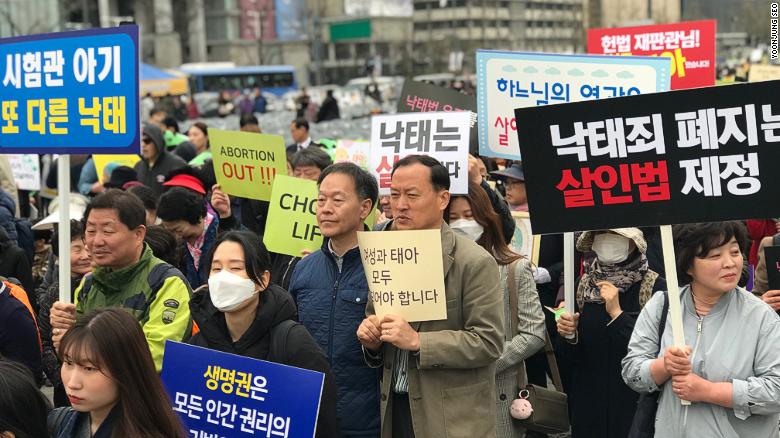Seoul (CNN)South Korea's 66-year abortion ban must be lifted by end of 2020 the country's Constitutional Court ruled Thursday, in a major win for pro-choice advocates.
Seven out of nine judges ruled that outlawing abortion was unconstitutional -- votes from six judges were needed to overturn the ban.
Lawmakers now have until December 31, 2020 to revise the law. Termination of pregnancy after 20-weeks will remain illegal.
Previously, women who had abortions in South Korea could face up to a year in prison and can be fined up to two million won ($1,780), while doctors or healthcare workers who helped terminate a pregnancy could be jailed for up to two years.
While prosecutions were rare, they were not unheard of.
Three-quarters of women aged 15 to 44 regarded the law as unfair, according to results of a survey released this year by the Korea Institute for Health and Social Affairs. Around 20% of respondents said they had had an abortion despite it being illegal.
Recent pressure to decriminalize the practice, however, had seen pushback from conservative and religious groups, some of which have links to US anti-abortion campaigns.
Crime and stigma
When she was 40 years old, Kim Kyung-hee realized she was pregnant. The after-school teacher and her husband already had two daughters and so decided to have an abortion.
In many countries, this would be a simple medical procedure, undertaken with the support of the healthcare system. But in South Korea, Kim was left only with the option of an illegal operation.
While Kim's abortion took place 12 years ago, she said she is still haunted by the knowledge that she committed a crime.
"I felt guilty for getting rid of a life to begin with, but the fact that it was a crime made it emotionally much more difficult," Kim said.
Kim said finding a clinic to perform the operation wasn't particularly difficult. She simply went to a large obstetrician-gynecologist hospital. "After I had confirmation that I was pregnant ... I told the doctor I wanted an abortion so we scheduled the date and time," she said.
Kim said she left the hospital as soon as the operation was over.
"I wasn't very healthy, so I should have stayed longer to fully recover but I felt that I had to get out," Kim said. She didn't tell her mother or siblings about it at the time.
Kim is not alone. According to the Health Ministry, 50,000 women had an abortion in South Korea last year.
That's down from 168,000 in 2011, according to the official data -- but many doctors disputed these figures saying the criminalization of the practice had distorted reporting of it.
They estimated the actual figure could be 10 times higher than that recorded by the government.
Kim believed the law had put an unjust burden on women.
"Pregnancy doesn't come about by women alone -- but to hold only women responsible makes the law very unfair," she said.
Changing attitudes
In 1953, South Korea criminalized abortion in most circumstances, with exceptions granted to cases involving rape, incest and genetic disability.
But in the following years, the law appeared to contradict other government policies, social norms and technological advances.
In the early 1960s, for example, the government launched a campaign to reduce the number of children per household, in a bid to get the population size under control.
Traditionally, South Korean couples had preferred sons over daughters, as they could carry on the family name, and so would keep having children until they had a boy. The new policy combined with the abortion ban left them with fewer legal options.


